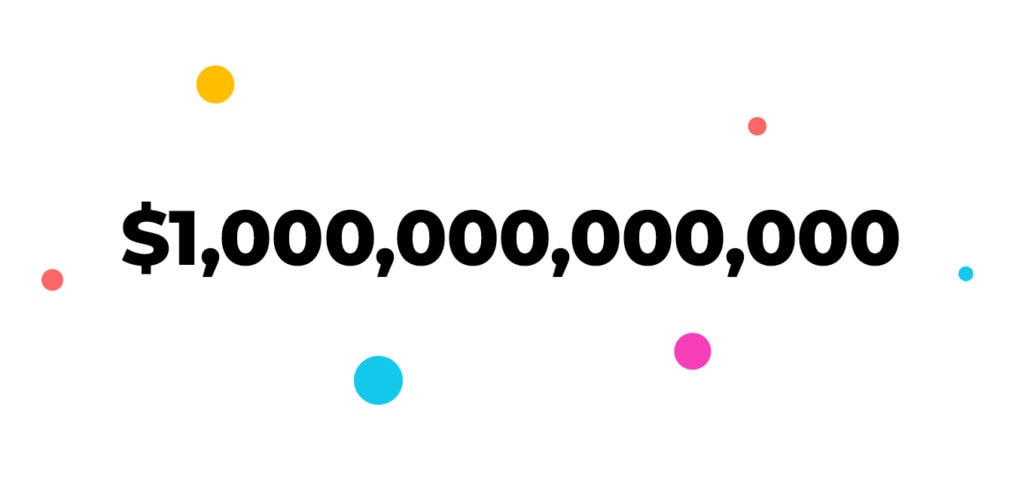Cryptocurrency is one of those things that no one is sure whether it is going to change the world or fade into history alongside 3D glasses and shaking hands with strangers. The interest in running crypto offers reflects that.
We are only at the beginning of understanding the importance and possible ramifications of digital cryptocurrencies and the tech that is backing it. We already know it’s going to be a big thing. We just don’t know exactly how the blockchain-backed world will unfold.
The internet, at its conception, was in the same situation.
If cryptocurrency was the Internet, it would be past 1975 but way before 1991 when the World Wide Web was introduced.
This, however, does not mean that Bitcoins are not profitable or useful right now. The whole crypto market is now worth one trillion dollars.
That’s a number with 12 zeros.

Cryptocurrency is predicted to change virtually all aspects of our digital lives. Surely, it has importance for affiliate marketers.
Crypto offers for affiliate marketers
Crypto is a whole separate vertical (or sometimes it is considered to be the part of the finance vertical). There are a lot of offers in it.
To advertise them properly, you need to know what cryptocurrencies and blockchain are. I won’t get into too much detail but bear with me – some details are necessary.
Blockchain vs Bitcoin
While Bitcoin is the best-known digital currency, blockchain is the tech that backs it, and other digital currencies. And there are a lot of other currencies (at least 1,000 +) that do so much more than just store value.
But let’s start with the basics.
What is Blockchain?
Blockchain is a technology of distributed databases.

Think about all the platforms you use on the Internet:
- Banks
- Social platforms
- Shopping
- Healthcare providers
Each of these platforms contains a database. It is a centralized database: one company has access and maintains all the data. You need to trust this company that they will do their job well.
How much do you trust Facebook? Your bank? A little? A lot? You definitely shouldn’t trust them completely.
It’s not even that they have an evil agenda and want to use your data for their own ominous purposes (though this may be the case with Facebook). In reality, the company that holds your data could simply be careless and get hacked.
This can’t happen with blockchain. Distributed database means that its records are stored on all computers in the network and each new record (for example, a transaction), has to be verified. Verification is done by computers that are a part of this network (they are called nodes).
The database consists of a chain of blocks, with each block representing a separate record. To tamper with such a database, you would have to hack the majority of computers on the network.
If you can do that, you don’t need to read the rest of this article.
Blockchain technology surpasses the single use case of digital currencies. It can be used for all important databases.
With blockchain technology, banks won’t be the single privileged party. Private or state-owned healthcare companies won’t be in sole control of sensitive medical data.
Blockchain empowers all parties and makes them equally responsible.
What is Cryptocurrency?
The name ‘cryptocurrency’ is the amalgamation of the words ‘cryptography’ and ‘currency’. Cryptography is responsible for making a digital currency secure by using various encryption techniques.
Cryptocurrency uses blockchain as a digital ledger of all transactions.
The name ‘currency’ is a bit misleading. It gives the impression that cryptocurrencies are something like a digital dollar. Which makes it even more confusing, as dollars, like all fiat currencies, are mostly represented by digital information.
Cryptocurrency does not only store value. I write more about this later, but for now you need to know that cryptocurrencies are so much more than just a digital coin.
What also makes cryptocurrencies different from fiat currencies is that there is no central issuer. No central bank.
The issuer is the algorithm. It works like this:
You want to send some money to your friend. If the algorithm confirms that you have enough coins to do so, the transaction will be verified by computers on the network. There are two ways to verify the transaction:
- PoW (Proof of Work). Computers on the network (nodes) have to solve a complex mathematical puzzle. The first one to complete the puzzle wins and gets some reward in cryptocurrency for their time and effort. This is what mining is: using your computer to verify transactions. This method uses a lot of electricity and expensive equipment, hence the alternative that has been developed.

- PoS (Proof of Stake). This method selects people that have coins to verify transactions. It is much less computation-heavy and is therefore preferred by more eco-oriented crypto enthusiasts.
Once the verification is done, a new block is added to the chain on all computers and your friends receive some digital coins.
What type of Cryptocurrencies are there?
Bitcoin is the oldest and most renowned cryptocurrency on the market, but it is far from being the only one.
There are many other currencies: newer and with different purposes in mind. We can easily divide cryptocurrencies into three categories:
- Value. These cryptocurrencies, like Bitcoin, are used to store and pass value. The market sets its price (when I wrote this, a single bitcoin was worth over $40,000) and people trade or pay with it.
- Apps. The more advanced type of cryptocurrency allows you to build whole decentralized apps (dApps) with them. These applications may serve various purposes, for example, trading real-world commodities. Of course, you cannot transfer a physical object via the Internet. Such objects (or any other things of value) are represented by tokens. An example of this type of cryptocurrency is Ethereum.
- Tokens. Such cryptocurrencies are used to represent various valued elements; they could be anything, from money to real estates.
The beautiful thing about cryptocurrencies is that you can use them in ways its creator has never thought of. Or you can always create a new currency that fits your purposes.
How do people Make Money With Cryptocurrency?
This question probably interests you the most. Well, there are several answers:
- HODLing. This adorable typo from one of the industry leaders has been adopted by the crypto community as the name for one of the main strategies: buying and holding digital assets until they gain value.
- Trading. Buying and selling digital coins on the crypto exchange is one of the most obvious ways of earning money. Traders must of course be aware of rapid fluctuations of some cryptocurrency’s values.
- Mining. Lending your rig to verify transactions is rewarded with money. You just have to get more money than you have to spend on the rig itself and electricity. When a cryptocurrency is dominated by GPU-based rigs, an ordinary person can get their share of the pie but when ASIC rigs start to be dominant– no amount of GPUs can compete with them. Also with Bitcoin (as it was mentioned before) because only the first one to solve the puzzle gets the reward, it is always better to work in groups and divide the reward among the group members.
- ICO. Similarly to IPO, ICO is launching a new venture in a public space. But unlike IPO, it is not a company on a stock exchange but rather a new cryptocurrency on a crypto exchange.
- Forking. Cryptocurrencies are dynamic entities and new and improved versions (called forks) of the old ones appear every now and then. On this occasion, people that have old currency are sometimes rewarded if they switch to new currency.
- Advertising. This is where you come in. Your job would be to find new investors or provide current investors with tools or services that ease the money-making business. In short, you would have to act as their investment advisor.
What are the top cryptocurrencies in terms of market capitalization?
Cryptocurrency market capitalization can be derived by multiplying the current price by the number of cryptocurrency coins in the circulation.
Because of these two factors change (the first one rapidly, the second one at a rather constant and predictable rate), the market cap changes with them.
At the moment of writing this article, the top cryptocurrencies per market cap are:
- Bitcoin
- Ethereum
- Tether
- Polkadot
- XRP
- Cardano
- Litecoin
- Chainlink
- Bitcoin cash
- Stellar
What kind of crypto offers are there?
That was a lengthy introduction to the topic, I’ll give you that. But once you know how the market works, you can select your offers more consciously and advertise more effectively.
There are a lot of affiliate crypto offers advertising crypto-related things. The main types of crypto offers are:
- Crypto exchanges
- Crypto wallets
- Affiliate programs
- Resources: Books, courses, webinars, financial apps, etc.
As it is common with other types of digital offers, crypto offers tend to have high commission rates that span from 15% to even 40%.
What are crypto affiliate programs?
Cryptocurrency-related affiliate programs offer paid access to various platforms that make crypto trading easier.
These may be crypto trading bots, tax calculators, automatic traders, and so on. Some of them are aimed at more advanced users, while others offer easy entry to the cryptocurrency world for newbies.
Cryptocurrency affiliate programs are a great way to monetize your carefully tailored audience.
What kind of traffic works best with cryptocurrency offers?
The truth is that a good advertiser can make cryptocurrency offers work on almost any traffic type, but the most natural habitat of these kinds of offers are native ads. But here’s a list of the best traffic types for crypto offers:
- Native. Native ads can nicely blend with the context of the web page and look like genuine finance-themed articles. They allow you to provide a lot of information to the user before they decide if they want to convert.
- Pops. This type of ad may flourish with users that are somewhat familiar with the topic. They hear from various sources that Bitcoins or other currencies are on the rise right now, and when a crypto ad pops out in front of them, they immediately will be interested in at least checking the offer out.
- Push. Push ads play on the FOMO (fear of missing out) of users that don’t want to miss out on the next big opportunity.
- Email. This works very well, provided that you have a decent email database, as emails appear more serious and allow you to provide more credible-looking content.
- Video. Ads with experts telling a visitor what a great opportunity they face may convert really well on a carefully targeted audience.
How to Advertise Cryptocurrency?
Cryptocurrency has some advantages over traditional, fiat currencies. Use them in your marketing message:
- Emphasize the decentralized control and freedom that comes with them. There are exceptions to this rule– Ripple for example is a cryptocurrency run more like a traditional fiat currency by big banks, but the majority exists over the distributed network.
- Advertise the safety aspect of cryptocurrencies. They are immune from hackers or police services.
- Stability may be a big selling point. Cryptocurrencies don’t allow you to send money you don’t have while traditional banks do that all the time (it is called ‘leveraging’)
- Anonymity in uncertain times is also something many users may respond to. Tell them that you don’t have to identify yourself in the network to be a part of it and make payments.
- Cryptocurrencies also beat fiat currencies in terms of speed. Bank transactions still often take a day or more to proceed while blockchain-backed currencies can send assets within minutes or even seconds.
- Scarcity makes cryptocurrency the digital equivalent of gold, which has a very limited supply. This applies only to some types of cryptocurrencies but many of them are created at a constant (and predictable) rate. Scarcity ensures more stable prices because the only thing that fluctuates is the demand side of the equation.
Central banks can print a lot of new money whenever the government needs some extra cash. This of course makes this currency worth less.
Blockchain and Bitcoin make everyone tick
Cryptocurrency-related terms are the ultimate buzzwords of the financial world. No one fully understands their potential, yet everyone thinks they are the next big thing.
The problem is that cryptocurrency represents a complex technology with various use cases, and this is something that deters your average person.
Your job, as an affiliate marketer focused on the crypto vertical, should primarily be to reduce the fear of the unknown and explain that Bitcoin is something that may soon be in everyday use, or already is something that can bring enormous profits.
Whatever tactic you select, you will always benefit when using a professional ad tracker in your cryptocurrency campaigns.
Voluum is the backbone of your affiliate efforts and an indispensable companion on your journey to affiliate glory.



